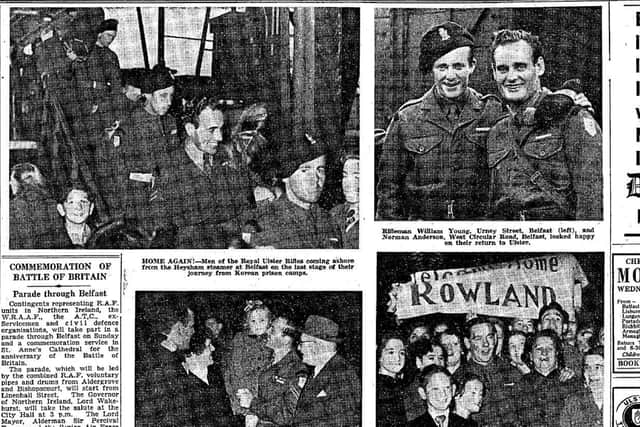A great welcome for prisoners-of-war returning from the Korean War (1953)
and live on Freeview channel 276
Crowds of mothers, sweethearts and relatives who waited on the quay to meet them were wearing red, white and blue carnival hats, waving Union Jacks and holding aloft banners bearing “Welcome home” slogans.
A lusty roar of welcome rose from the crowd as the vessel came into sight, and as it edged slowly to its berth, round upon round of cheering mingled with the singing of “Pack Up Your Troubles” and “Old Soldiers Never Die”.
Advertisement
Hide AdAdvertisement
Hide AdThe men lining the ship’s rails smiled broadly as a group of grandmothers linked arms and did an impromptu step-dance as the ship tied up.


Even before the gangway was made fast, Mrs Mary Fenner, of Beverley Street, Belfast, rushed up it to embrace the first man to leave the ship, her son, Private William Fenner (26), who had been captured with the Gloucesters.
Speaking of his prison camp experiences, Private Fenner said: “We had ‘Commie’ lectures seven hours a day, seven days a week at first. It was pretty grim and damned monotonous – but we got used to it.”
Rifleman Norman Anderson (25) of West Circular Road, Belfast, who was captured at the Imjin River and was a prisoner for more than two years, said that conditions had been “really rotten” at first, but got better towards the end. “The peace talks had a lot to do with it,” he added.
Advertisement
Hide AdAdvertisement
Hide AdHe continued: “We were marched about 50 miles every night with short breaks – but somehow the poor old feet stood up to it. The going was hard. About eight of our fellows were carried off for burial every morning in those first days. We had no medical men with us. All we had was one Chinese doctor.”
One of the first to recognise Rifleman David George Fulton, Royal Ulster Rifles from Boyd’s Square, Dungannon, at the Great Northern Railway station in Belfast, was his six-year-old daughter, Rosemary, who rushed across the station entrance shouting “Daddy, Daddy” and hugged him. Fulton, who had been captured at Death Valley on January 3, 1951, had arm and leg wounds.